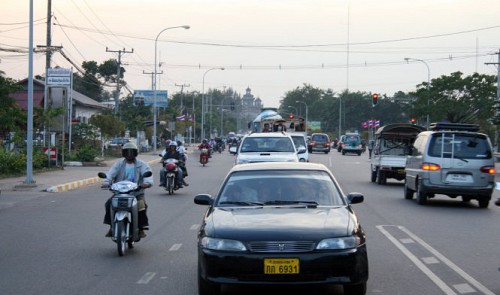During a recent trip a Tuoi Tre (Youth) newspaper reporter gaped at two Laotian drivers reacting amazingly politely following a car crash.
Such affability among Laotians is a far cry from the unfriendliness displayed by a large number of Vietnamese people that sometimes verge on aggression and hostility, Quoc Viet, the Tuoi Tre reporter noted.
In times of accidents or minor crashes, particularly in large cities such as Ho Chi Minh City and Hanoi, their instant hardwired reactions are to jump out of their vehicles, quickly becoming physically and verbally aggressive.
A crowd of inquisitive spectators soon forms that can block traffic flow for hours.
A morning in early April 2016, while Viet, the Tuoi Tre reporter, was strolling around in the Laotian capital city of Vientiane, he witnessed a seven-seat car abruptly veering to its left to avoid plowing into two schoolgirls crossing the street without any warning.
The driver of a pickup truck on its right failed to apply his brakes and the two vehicles collided.
As both drivers were driving slowly, they calmly got out of the automobiles unscathed to check the damage.
Contrary to Viet’s expectations, the two drivers walked together to the sidewalk, where they phoned the police and their insurance companies.
Meanwhile, they bought each other a coke and spoke politely in the hot sun as if they were old friends.
The astonished Tuoi Tre reporter could not keep his eyes off the duo.
Police officers and insurance staffers showed up at the scene less than 15 minutes later.
The two drivers soon found themselves shaking hands before continuing their separate ways.
Viet was also told that Laotians consider accidents something shameful and not worth watching.
Tran Van Tai, a Vietnamese man who has been doing small business in Luang Prabang for nine years now, narrated to Viet an accident with a ‘bizarrely’ happy ending he himself was involved in some months ago.
Tai was driving drunk back from a party when he crashed his pickup truck into a house.
The head-on collision smashed a wooden door and wall before knocking a man sleeping inside to the ground.
The victim walked out with several scratches and bruises, while Tai became unconscious on impact.
To his astonishment, Tai later found out that it was his victim that rushed him to hospital and informed his relatives of the accident.
“If he had left me lying untended to while waiting for the police to come, I’m not sure how severe my injury would have been or if I would’ve been the victim of a revenge assault,” Tai said with gratitude.
Discharged from hospital, he and his insurance company fully paid damages to his kind victim and the two soon became best of friends.
Tai revealed that before settling down in Laos, he had been a trader traveling across different Vietnamese provinces for nearly 10 years.
He said he once sought refuge in a police station from an assaulter who had caused an accident.
Che Quang Long, a representative for Vietnamese property developer Hoang Anh Gia Lai Group in Vientiane, said he has constantly hit the road since 2009.
“Thanks to the economic boom, more Laotians own cars these days, outnumbering the number of motorbikes on the road,” Long noted.
“Just like in Vietnam, congestion is unavoidable throughout the Laotian capital during rush hour. However, I’ve never seen an accident lead to chaos or fighting.”
Long also challenged the Tuoi Tre journalist to spot any lane trespassers, though traffic police officers or monitoring cameras are a rare sight in the ‘Land of a Million Elephants.’
“Occasional violators are mostly new car owners learning how to drive, or expats who have just arrived in the country,” he added.
Long and the journalist both observed that very few drivers honked their horns.
Professor Soulyphan Tha Kanni, of the National University of Laos, the journalist’s long-time companion in that country, also noticed striking differences regarding the traffic situation between his nation and Vietnam, which he considers his second homeland.
Residents in Laos, most of whom are devout Buddhists under a conviction that their potential victims were their beloved ones in their previous or succeeding life, drive cautiously and strictly abide by traffic laws, the professor explained.
The Tuoi Tre journalist was also impressed by Kham Sak, his driver during the April 2016 trip, patiently waiting for groups of schoolchildren to cross the street.
“What’s wrong with waiting for a while? If I honk, that will upset the kids and people around,” he said smilingly.
“Foreigners will pick up on Laotians’ ability to keep their composure after being around for some time. We can’t be aggressive if everyone around is meek and amicable,” Long, the Hoang Anh Gia Lai Group representative, concluded.
Laos, the only landlocked nation in Southeast Asia, is bordered by China, Vietnam, Cambodia, Thailand, and Myanmar.
The 236,800 square kilometer country has a population of approximately 6.6 million.
Its economic growth rate averages eight percent annually.
According to the World Bank, the country currently boasts a fleet of nearly one million cars, or one automobile for every seven Laotians.
The number is on an impressive rise, with around 30,000 new cars each year, compared to Laotians’ humble average per capita income of more than US$1,700, though in large cities such as Vientiane and Luang Prabang that number jumps to over $3,000.
























































